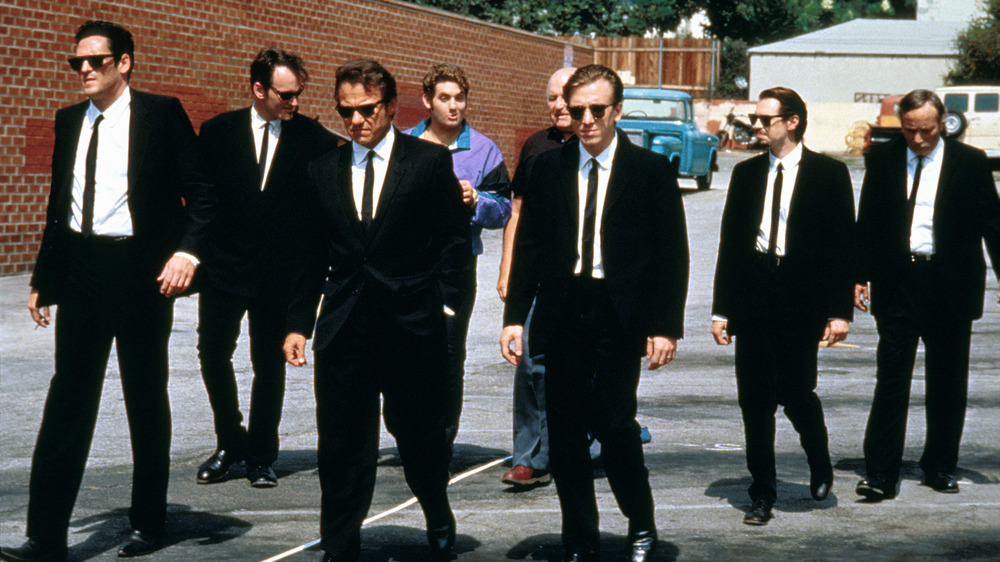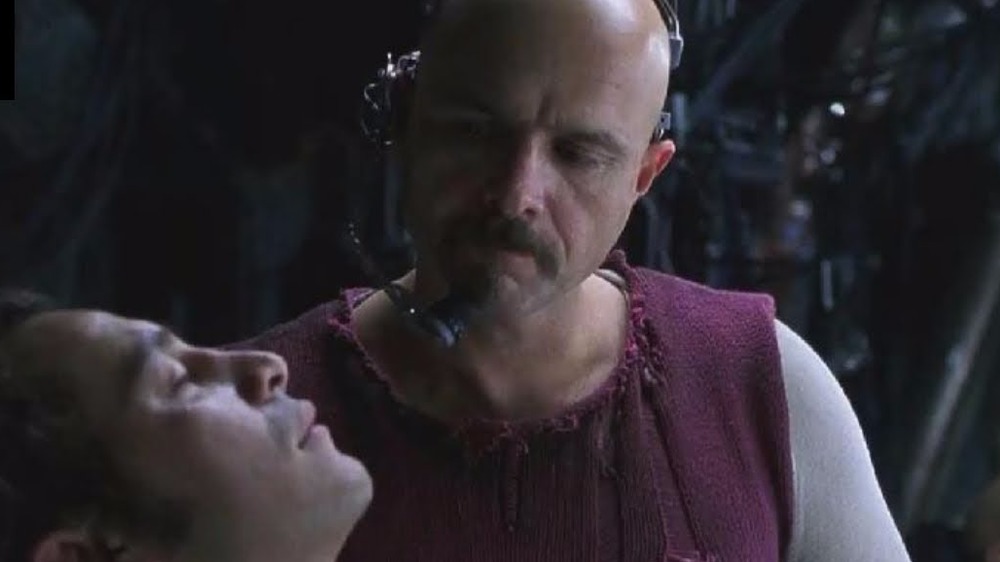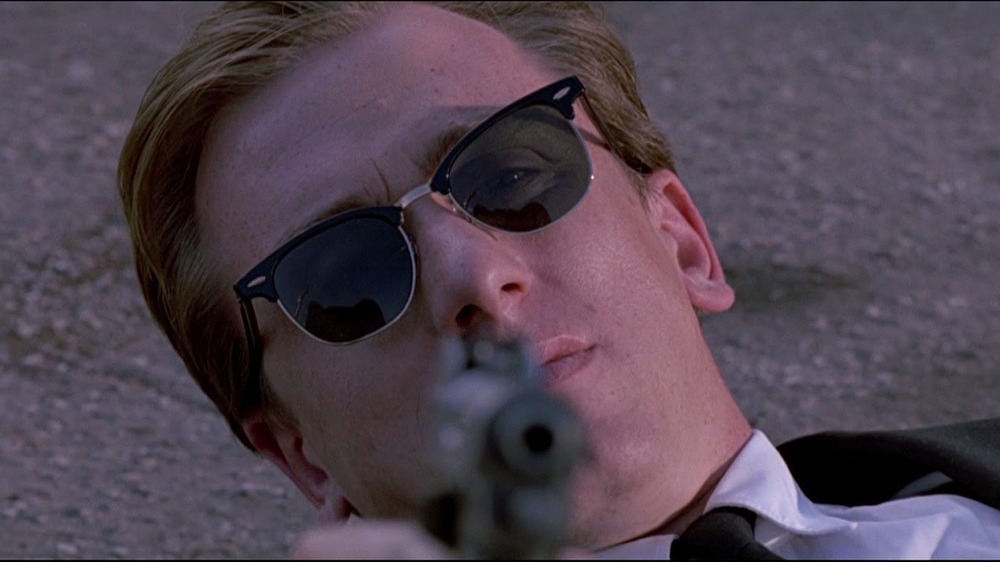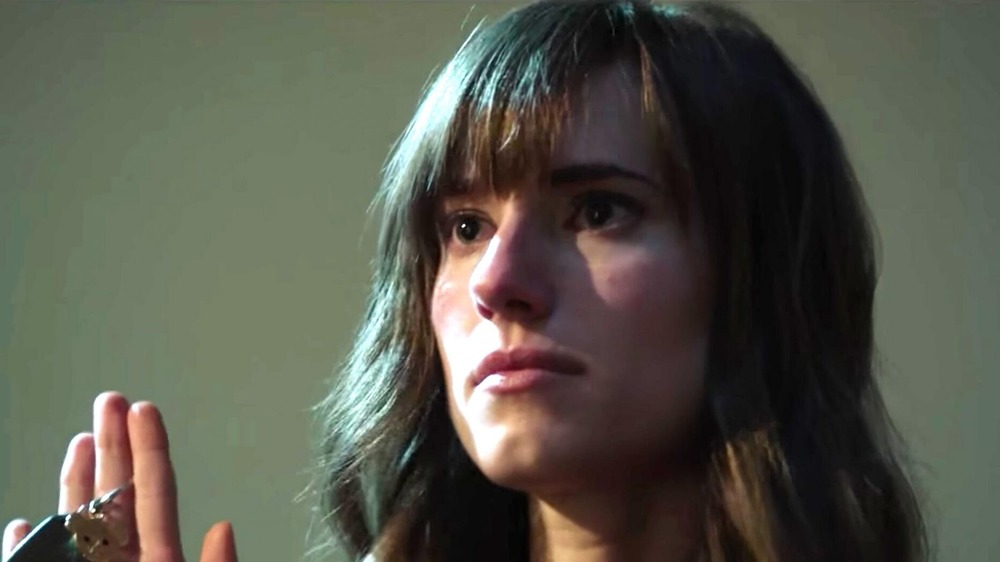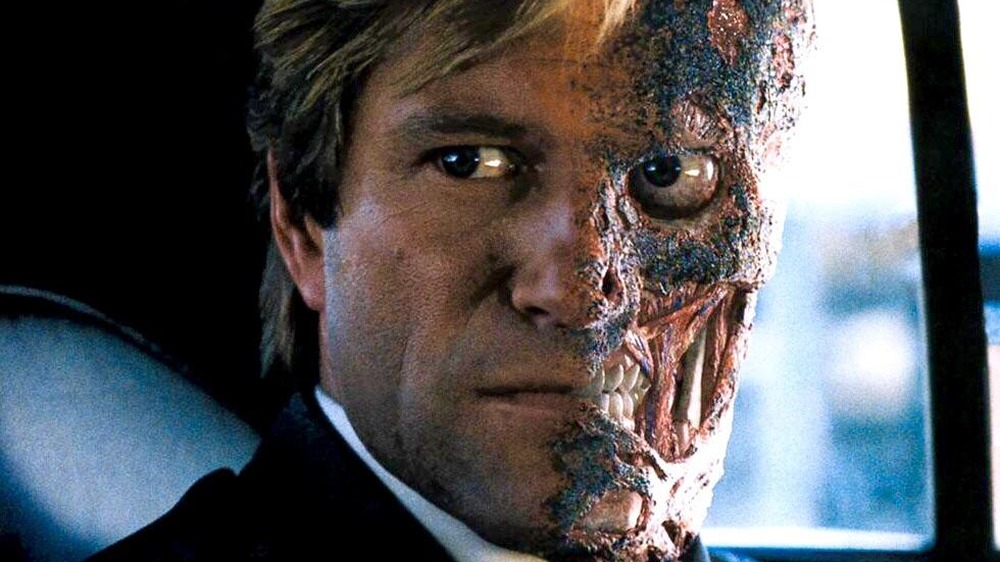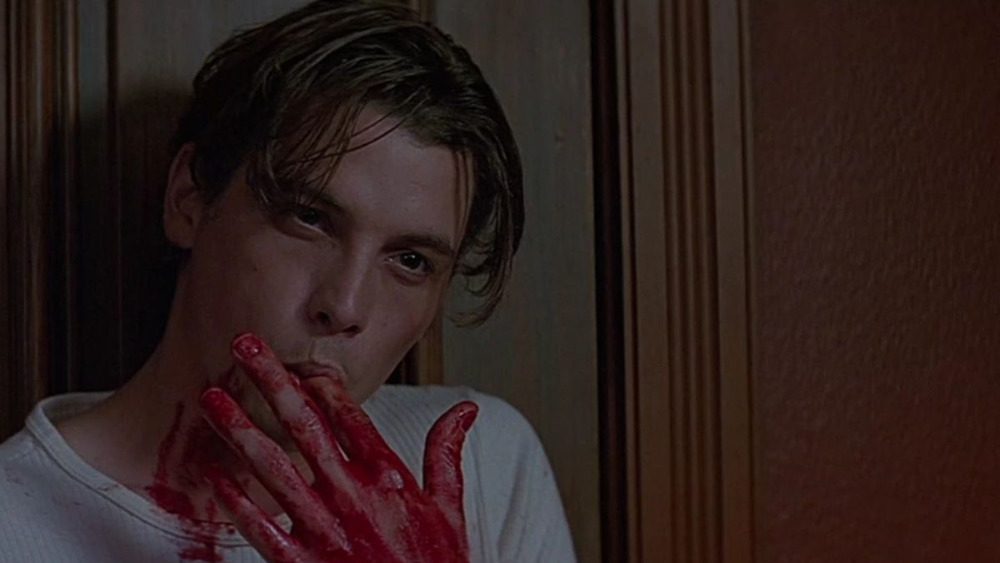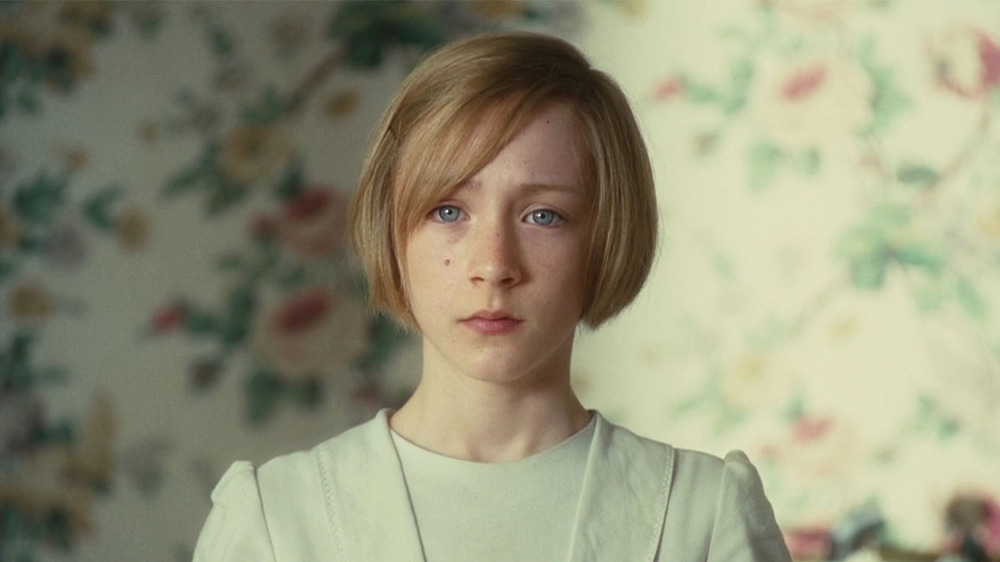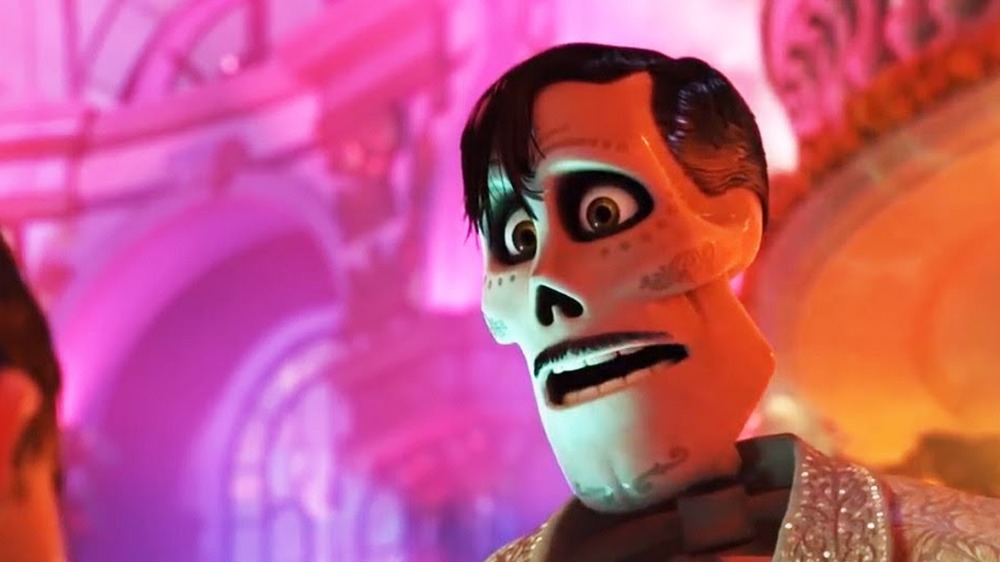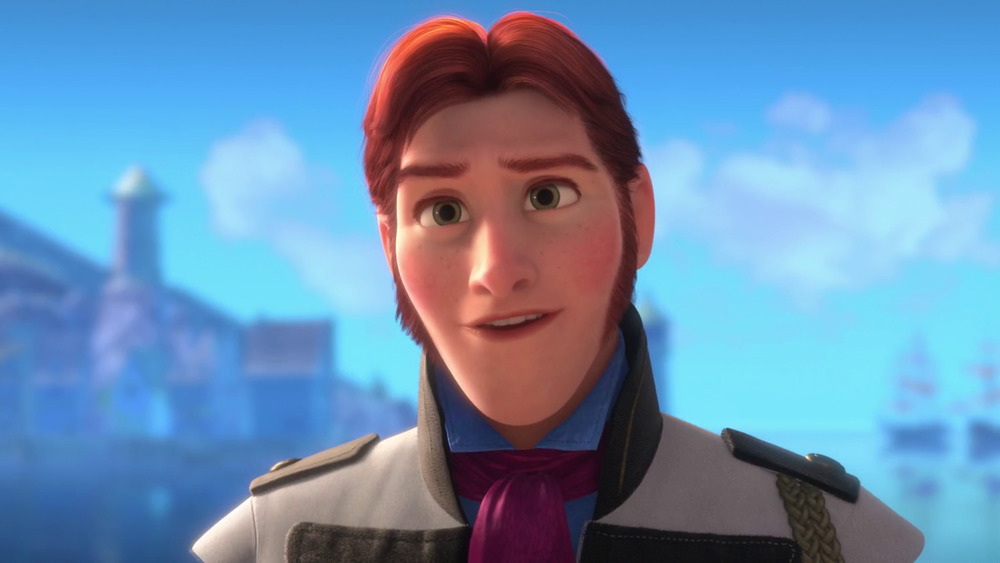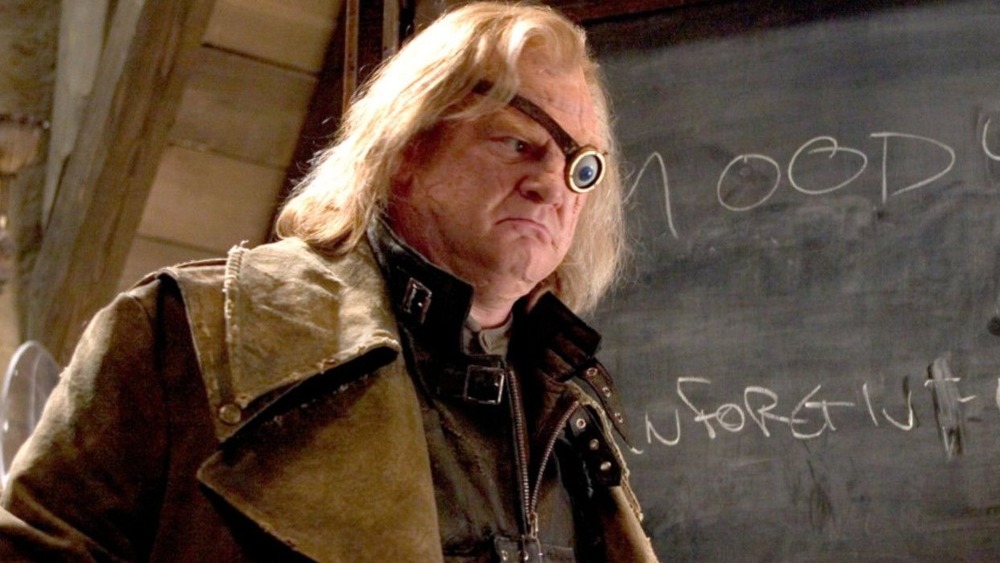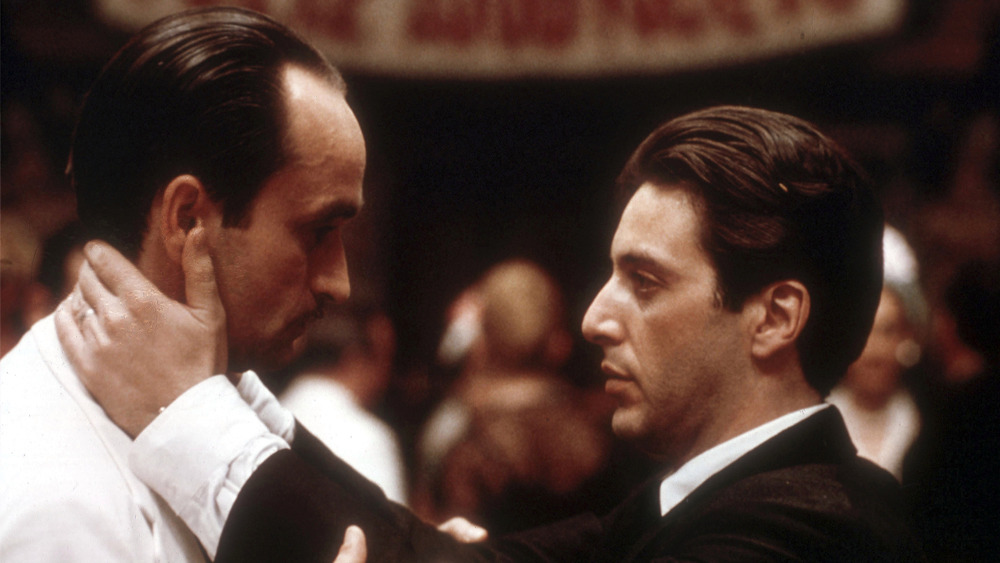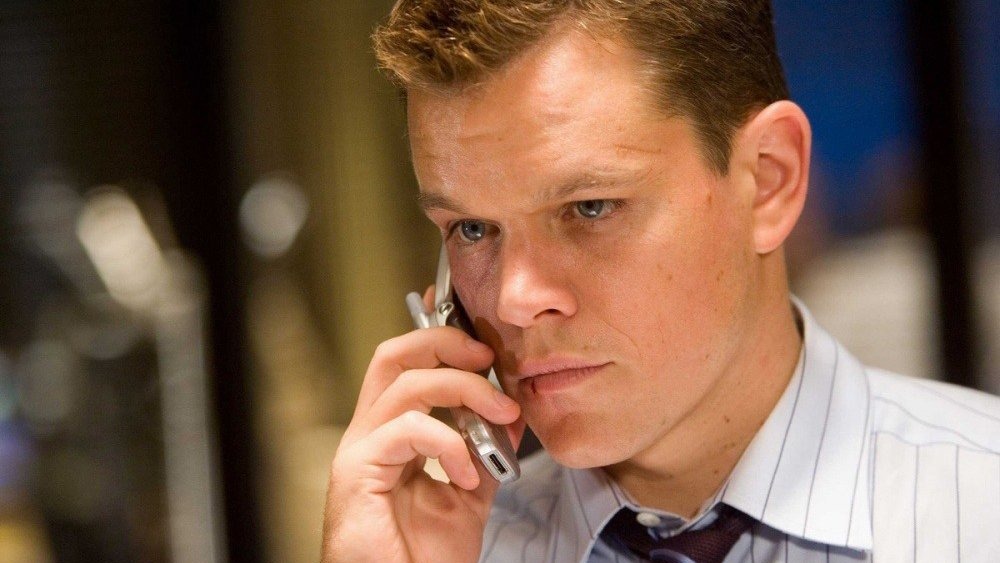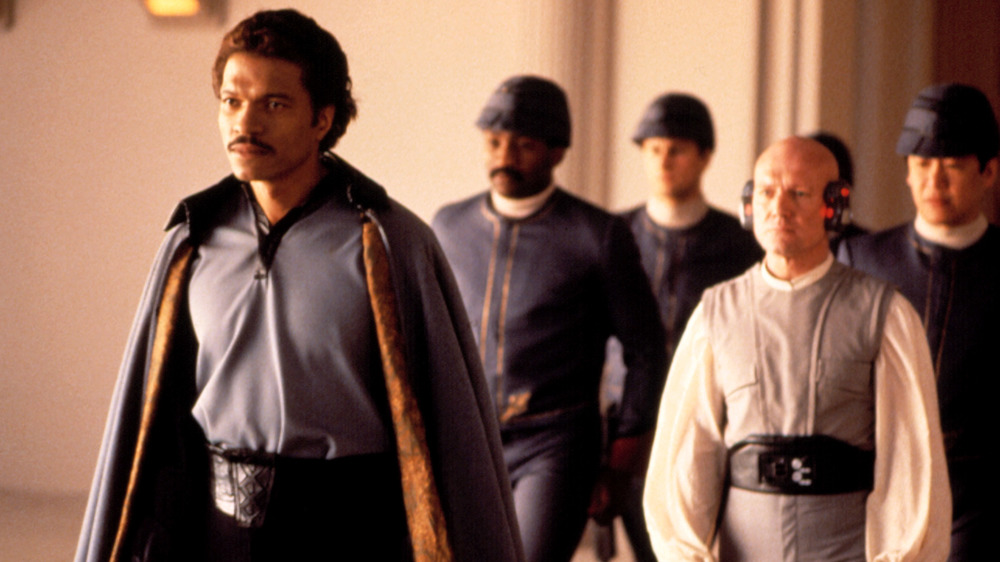The Most Shocking Betrayals In Movie History
Throughout movie history, viewers have become accustomed to huge plot twists and narrative turns, which can certainly spice up an otherwise predictable movie. Between films like The Sixth Sense, Fight Club, The Usual Suspects, and others like them — and even if you go all the way back to classics like Citizen Kane – cinematic history is filled with twist endings and third-act surprises, which help keep audiences guessing throughout the film.
However, aside from twist endings, there's another very specific kind of narrative shocker writers and directors keep up their collective sleeve: betrayal. Throughout the run time of a good film, audiences will find ways to connect with the characters, and as a result, it can be extraordinarily devastating on the audience — whether the character they love is the betrayer or betrayed. From science fiction epics to Tarantino classics to comic book adaptations to family-friendly animated flicks, here are just a few of the most shocking betrayals in movie history. Spoilers for all of these films to follow!
Cypher turns on his crewmates in The Matrix
In the Wachowskis' genre-defining science fiction epic The Matrix, which hit theaters in 1999, viewers were introduced to a world where humans have been dominated by machines after a lengthy war and the destruction of the sun, placed into pods, and sent to live in "the Matrix," a computer-generated simulated reality. When Tom Anderson (Keanu Reeves), renamed "Neo," learns the truth from his mentor Morpheus (Lawrence Fishburne) and his right-hand woman Trinity (Carrie-Anne Moss), he chooses to leave the Matrix behind and return to the real world. Upon arrival, he finds himself in a run-down dystopia where humans must hide from the machines — inside and outside of the Matrix — to survive.
Meanwhile, a trusted member of Morpheus' crew, Cypher (Joe Pantoliano) is secretly working with the Matrix's band of evil Agents, trading his friends' livelihood for a comfortable life of ignorance and bliss. In a shocking turn during a mission, Cypher leaves the Matrix for the real world first and brutally murders most of the ship's crew, in a stunning betrayal that left audiences reeling in the aftermath. Neo ends up saving the day in the end, but Cypher's abrupt betrayal has serious consequences.
Mr. Orange is undercover in Reservoir Dogs
Throughout Quentin Tarantino's 1992 feature-length debut Reservoir Dogs, which put the acclaimed director on the map in a big way, the gang of thieves who feature at the center of the film are only known by codenames: Mr. White (Harvey Keitel), Mr. Orange (Tim Roth), Mr. Blonde (Michael Madsen), Mr. Blue (Edward Bunker), Mr. Brown (Tarantino), and Mr. Pink (Steve Buscemi). After a planned diamond heist goes wrong, the group kidnaps a policeman, torturing him in one of the film's most brutal and unforgettable scenes.
However, before long, the gang realizes there's a mole in their midst. Mr. Orange, who was injured during an earlier shootout, confesses that he's an undercover cop, shooting and killing Mr. Blonde. Mr. White, floored and devastated by his friend's betrayal, ultimately kills Mr. Orange after a standoff, and Mr. Pink makes off with the diamonds, botching the entire heist and leaving pretty much everybody else for dead. Tarantino is no stranger to either shock value or violence, but the betrayal in Reservoir Dogs is one of his most startling twists as a director.
Rose's turn toward evil in Get Out
In Jordan Peele's 2017 Academy Award-winning directorial debut Get Out, audiences are immediately introduced to a young couple, Chris (Daniel Kaluuya) and Rose (Allison Williams), who are headed to visit Rose's family for a weekend. Though Chris is initially nervous that Rose's family will disapprove of their interracial relationship, Rose assures him there won't be any problem, and they head out to the remote Armitage family estate in the country.
After he's introduced to Rose's parents, Missy (Catherine Keener) and Dean (Bradley Whitford) Armitage — as well as her erratic brother Jeremy (Caleb Landry Jones) — Chris starts to settle in, but he also notices some strange things throughout the house, especially the Armitages' Black employees and their behavior. After the Armitages have a party that goes awry, Chris wants to leave, and Rose readily agrees. There's only one problem: Chris can't drive. As Rose dangles the car keys in Chris' face, taunting him, he realizes that she's been in on her parents' gambit all along, and is kidnapping Chris — as she has done with so many other Black lovers — to steal his body for a wealthy white patron. Williams' performance in Get Out is pitch-perfect, and the more you re-watch the film, the more you'll see her heartbreaking betrayal coming.
Harvey Dent becomes Two-Face in The Dark Knight
In Christopher Nolan's critically beloved Dark Knight trilogy, the British auteur takes on a darker side of Bruce Wayne's story, and that storytelling lens extends to some of Batman's most famous villains as well. In the series' middle installment, 2008's The Dark Knight, viewers are introduced to Nolan's pitch-black take on the Joker, played to perfection by an award-winning Heath Ledger in one of his final roles before the star passed away in 2008. But there's another villain lurking in plain sight.
Introduced as Gotham's district attorney, the virtuous Harvey Dent (Aaron Eckhart) sets out to save Gotham from lowlifes like the Joker, but after the super-villain kills Dent's girlfriend and Bruce Wayne's (Christian Bale) childhood love Rachel Dawes (Maggie Gyllenhaal), Dent is a changed man... literally. With half his face blown off in an explosion caused by the Joker, Dent becomes Two-Face, flipping a coin to decide who lives and who dies in Gotham. Bruce has very few allies to begin with, and losing Dent in his prime is a serious blow, especially after both men lose the love of their life.
Sidney's killer boyfriend in Scream
Wes Craven's 1996 horror classic Scream has become a staple of the genre over the years, thanks in large part to its clever storytelling — especially its gutting twist ending. As the film begins — after one of the most unforgettable opening sequences in movie history — we meet Sidney Prescott (Neve Campbell), a high school student grappling with the one-year anniversary of her mother's murder amidst a new string of killings in the sleepy small town of Woodsboro, California.
Throughout the movie, the masked killer, knife in hand, constantly stalks Sidney and her friends, and the chase comes to a gruesome conclusion after a huge party where the killer takes out most of her high school classmates. As it turns out, there's not one, but two killers — Sidney's boyfriend, Billy Loomis (Skeet Ulrich), and his goofy friend, Stu Macher (Matthew Lillard), have been working together. Not only did they murder several teenagers, they also killed Sidney's mother one year earlier. Ultimately, Sidney and other survivors rally together and kill Billy and Stu themselves, putting an end to their killing spree, but this betrayal was, understandably, a horrible blow to Sidney.
Fact vs. fiction in Atonement
Based on Ian McEwan's award-winning novel of the same name, Joe Wright's 2007 period piece Atonement spans several different timeframes to tell the story of star-crossed lovers in 1930s England and their fates, both real and fictional. In 1935, a young Briony Tallis (Saoirse Ronan, in her first Academy Award nominated role) takes notice as her beautiful older sister, Cecilia (Keira Knightley) begins a flirtation with their wealthy family's groundskeeper, Robbie (James McAvoy). After finding explicit letters from Robbie to Cecilia, Briony, who has feelings for Robbie, gets the wrong idea, and when she finds Robbie and Cecilia in a compromising position in the family's library, Briony tells her family that Robbie assaulted Cecilia. From there, Robbie is accused of a separate assault, and sent away to prison.
After serving time in prison and serving as a soldier in World War II, Robbie and Cecilia start a life together in London, and Briony goes to apologize, giving a seemingly happy ending to the story. However, as it turns out, this ending is fiction, concocted by a much older Briony (now played by Vanessa Redgrave) to cover for her sins. As it turns out, when Briony falsely accused Robbie of sexual assault, he then died in the war before seeing Cecilia again, and Cecilia died in one of the Blitz bombings in London. In writing a happy ending for Cecilia and Robbie, Briony tries to repair her betrayal, but unfortunately, real life can't be rewritten.
The truth about Ernesto in Coco
In Pixar's 2017 ode to Mexico's Day of the Dead, Coco, a twelve-year-old boy and aspiring musician named Miguel (Anthony Gonzalez) accidentally ends up transported from his home in Santa Cecilia to the Land of the Dead after he steals the guitar of the long-dead, very famous guitarist Ernesto de la Cruz (Benjamin Bratt). At the time, Miguel thinks — thanks to a picture in his great-great-grandmother's house — that Ernesto is his great-great-grandfather, and as a result, he believes he can carry on Ernesto's legacy.
However, Miguel soon discovers that Ernesto isn't quite what he seems. After meeting Héctor (Gael García Bernal), a trickster ghost, Miguel eventually learns the truth: Héctor is actually both his great-great-grandfather and the talented musician. Ernesto, Héctor's former partner, poisoned Héctor, stole his guitar, and took all the credit. Héctor, not Ernesto, is the man in Miguel's photo. Eventually, Héctor and Miguel are able to restore glory to Miguel and destroy Ernesto's fake legacy, but even so, Ernesto's utter shamelessness — and his awful betrayal — is unforgivable.
Prince Charming isn't who you think in Frozen
Beyond the hit song "Let it Go," Disney's 2013 mega-hit Frozen is a notable installment in the studio's canon thanks to its clever plot and subversion of typical Disney tropes. As the film begins, audiences meet sisters Anna (Kristen Bell) and Elsa (Idina Menzel), who must soldier on after their parents' tragic death, despite the rift between them caused by Elsa's magical, ice-based powers. During Elsa's coronation as queen of Arendelle, Anna falls head over heels in love with the handsome, dashing Prince Hans (Santino Fontana), who seems like the perfect Prince Charming. Despite her sister's misgivings that Anna would marry somebody she's just met, Anna and Hans get engaged.
As it turns out, Hans is far from a classic Disney prince: he's actually in Arendelle to kill both Anna and Elsa and claim the throne for himself and the southern isles from which he hails. In the end, just as Hans is about to kill Elsa, Anna sacrifices herself to save her sister, and Elsa saves her life in return. Even though Anna does find her true love in the end — Jonathan Groff's humble yet sweet iceman, Kristoff — love between sisters, not romantic love, triumphs over everything else, despite Hans' horrible betrayal.
Mad-Eye Moody's true identity in Harry Potter and the Goblet of Fire
Within the Harry Potter series, the students of Hogwarts end up with a new Defense Against the Dark Arts professor every single year – thanks to a long-standing curse – and in their fourth year, chronicled in Harry Potter and the Goblet of Fire, that teacher is Alastor "Mad-Eye" Moody (Brendan Gleeson). A heavily scarred and formidable Auror (or Dark Wizard catcher) bearing a fake eye with a mind of its own, Mad-Eye teaches Harry (Daniel Radcliffe) and his classmates some pretty dangerous spells, telling them to remain constantly vigilant in the face of dangers like Lord Voldemort (Ralph Fiennes) and his Death Eaters.
However, Mad-Eye definitely isn't what he seems... or even Mad-Eye at all. As the international Triwizard Tournament comes to a close at Hogwarts, Harry discovers Mad-Eye's horrifying secret: he's not the real Mad-Eye Moody, but a wanted Death Eater, Bartemius Crouch Jr. (David Tennant), using Polyjuice Potion to impersonate the Auror. After getting close to the man he thought was Mad-Eye throughout the year only to discover that his professor was really a Death Eater trying to deliver him to Voldemort, Harry feels betrayed — and it's easy to see why.
Fredo's deception in The Godfather Part II
Based on Mario Puzo's 1969 novel of the same name, Francis Ford Coppola's 1972 adaptation The Godfather is still regarded as one of the best films of all time decades after its release — and its 1974 sequel, The Godfather Part II, is considered by many to be even better than its predecessor. Following the story of the powerful Corleones, a Mafia family, The Godfather Part II picks up where the first left off, focusing on Michael Corleone (Al Pacino), now the Don of the family, trying to protect himself and his loved ones after an assassination attempt.
Thanks to The Godfather Part II, the name "Fredo" has become synonymous with "traitor" — in the vein of Brutus, Judas, or Benedict Arnold — and there's no doubt as to why. Played by John Cazale, Fredo, Michael's brother, feels disrespected and overlooked, and as a result, he participates in a plot to have Michael killed. After Michael discovers Fredo's plan, he confronts his brother, and though Fredo denies it, Michael sets his own plan in motion to have Fredo killed once their mother dies. After her passing, Michael has Fredo killed at the end of the film, making it very clear that if you betray someone as powerful as Michael Corleone, you'll face the most serious of consequences.
Sullivan's selfishness in The Departed
Martin Scorsese's 2006 mob epic The Departed, which won Best Picture at the Academy Awards the year after its release, features plenty of betrayals and backstabbing, but only one character is truly the king of the double cross. Massachusetts State Police officer Colin Sullivan (Matt Damon) might seem like a fine, upstanding man, but for years, he's been indebted to and working with mob boss Frank Costello (Jack Nicholson) and his clan, working as a mole within the FBI to keep Costello's empire running. However, when Billy Costigan (Leonardo DiCaprio) joins the police force in secret to work as a mole within Costello's organization, the two men scramble to uncover the other mole first.
Unfortunately for Costigan, Sullivan is selfish to a fault, and will stab absolutely anybody in the back to save his own skin. After enduring his own personal betrayal when he finds out that Frank has been working as an informant for the police for years, Sullivan shoots Frank — his father figure — and mows through anyone else he can, indirectly killing Costigan and directly killing several other police officers to try to salvage his reputation. However, in the end, his betrayals come back around; as he tries to run, he's killed by Staff Sergeant Dignam (Mark Wahlberg) at the eleventh hour.
Lando hands Han over in The Empire Strikes Back
The original Star Wars trilogy is home to plenty of beloved characters, but few supporting players made as strong an impression as the dashing, quick-witted con man Lando Calrissian (Billy Dee Williams). However, one of Lando's most shocking moments comes in the original trilogy's middle film, The Empire Strikes Back, which sees him betray one of his closest friends and allies.
When audiences first meet Han Solo's (Harrison Ford) "old friend" Lando, the former gambler is working as the administrator of Cloud City, and though Lando welcomes Han with open arms, he ends up stabbing his friend in the back. When faced with threats from Darth Vader, Lando hands Han over, allowing him to be encased in carbonite, and gives Leia Organa (Carrie Fisher) and Chewbacca (Peter Mayhew) over to Vader as well. Thankfully, Lando fully redeems himself by helping Leia and Chewbacca escape in the Millennium Falcon and eventually rescue Han from Jabba the Hutt, but in the moment, his betrayal stings pretty badly all the same.
